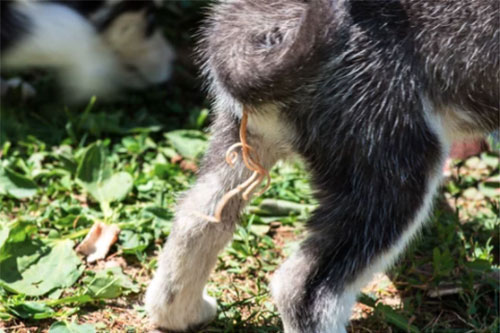Roundworm infection, also known as nematode infection, refers to the presence of parasitic worms called roundworms or nematodes in the dog’s intestinal tract. These worms reside, multiply, and thrive on partly digested food. Almost every dog may encounter this common infection in their lifetime, leading to a wide range of symptoms. The appearance of roundworms varies, often displaying a white or brownish color. They can grow to significant sizes, resembling spaghetti. This condition is frequently observed in young dogs and can manifest as roundworm infection symptoms in dogs, potentially causing discomfort and health issues.

What causes roundworm infection in dogs?
Newborn pups can inherit these parasites from their infected mother, either before birth or by drinking their mother’s milk. Even after treating the mother for an infection, encysted larvae could potentially remain dormant inside the female dog’s body until pregnancy occurs. Pregnant dogs pass on larvae to their puppies. Eating small animals that carry roundworm larvae in their bodies can also infect dogs. They may ingest the parasitic eggs from their surrounding objects, trees and ground. Ingesting another animal’s stools or sniffing a dog’s stools can lead to roundworm infection in the dog.
Roundworm infection symptoms in dogs
- Weakness – Puppies have an increased risk of being infected with roundworms as their immunity is not yet developed. You can see that the affected dog loses weight, despite of being fed well. The dog becomes inactive and weak and growth may also be stunted in case of untreated roundworm infection.
- Bulged belly – When the roundworms remain undiagnosed in the dog’s body, their population can grow and multiply rapidly. The presence of multiple adult worms in their stomach can make their belly look bulged or swollen.
- Vomiting and diarrhea – These worms can cause digestive problems and lead to vomiting and diarrhea. Sometimes, these worms can be seen in dog’s vomit or poop.
- Coughing- The infection can reach to an extent where the worms reach the lungs and cause coughing fits or respiratory conditions.
Dull coat – The hair of the dog may lose its sheen and appear dull.